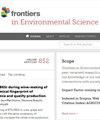环境监管、产业转型和绿色经济发展
IF 3.3
3区 环境科学与生态学
Q2 ENVIRONMENTAL SCIENCES
引用次数: 0
摘要
背景由于生态和环境问题的不断升级,绿色发展至关重要,而绿色发展在很大程度上是由产业转型和环境立法推动的.目的本文旨在研究环境规制和产业变革对绿色经济的综合影响,在此基础上研究它们各自的单独影响.方法我们使用固定效应回归对 2010-2020 年中国 30 个省份的面板数据进行研究.结果我们得出以下结论:环境规制和产业结构的合理化都支持绿色经济的增长,但产业结构的升级阻碍了绿色经济的增长.讨论通过提供具体的经验事实,本研究阐明了产业转型和环境规制对绿色经济增长的影响,有助于丰富相关文献,为可持续发展铺平道路。本文章由计算机程序翻译,如有差异,请以英文原文为准。
Environmental regulation, industrial transformation, and green economy development
BackgroundGreen development, which is crucial because of the escalating ecological and environmental issues, is largely driven by industrial transformation and environmental legislation.PurposeThe paper aims to examine the combined effects of environmental regulations and industrial change on the green economy, based on their separate effects.MethodsWe use a fixed-effects regression on panel data covering 30 provinces in China in 2010–2020.ResultsWe reach the following conclusions: environmental regulations and rationalization of the industrial structure both support growth in the green economy, but advancement in the industrial structure hinders it. The combined effect of environmental regulations and advancement and rationalization in the industrial structure has a significantly positive impact on growth in the green economy; it is most pronounced in regions with higher resource endowments and economic development.DiscussionBy providing specific empirical facts, this study clarifies the effects of industrial transformation and environmental regulations on growth in the green economy, contributing to enriching the literature and helping to pave the way to sustainable development.
求助全文
通过发布文献求助,成功后即可免费获取论文全文。
去求助
来源期刊

Frontiers in Environmental Science
Environmental Science-General Environmental Science
CiteScore
4.50
自引率
8.70%
发文量
2276
审稿时长
12 weeks
期刊介绍:
Our natural world is experiencing a state of rapid change unprecedented in the presence of humans. The changes affect virtually all physical, chemical and biological systems on Earth. The interaction of these systems leads to tipping points, feedbacks and amplification of effects. In virtually all cases, the causes of environmental change can be traced to human activity through either direct interventions as a consequence of pollution, or through global warming from greenhouse case emissions. Well-formulated and internationally-relevant policies to mitigate the change, or adapt to the consequences, that will ensure our ability to thrive in the coming decades are badly needed. Without proper understanding of the processes involved, and deep understanding of the likely impacts of bad decisions or inaction, the security of food, water and energy is a risk. Left unchecked shortages of these basic commodities will lead to migration, global geopolitical tension and conflict. This represents the major challenge of our time. We are the first generation to appreciate the problem and we will be judged in future by our ability to determine and take the action necessary. Appropriate knowledge of the condition of our natural world, appreciation of the changes occurring, and predictions of how the future will develop are requisite to the definition and implementation of solutions.
Frontiers in Environmental Science publishes research at the cutting edge of knowledge of our natural world and its various intersections with society. It bridges between the identification and measurement of change, comprehension of the processes responsible, and the measures needed to reduce their impact. Its aim is to assist the formulation of policies, by offering sound scientific evidence on environmental science, that will lead to a more inhabitable and sustainable world for the generations to come.
 求助内容:
求助内容: 应助结果提醒方式:
应助结果提醒方式:


